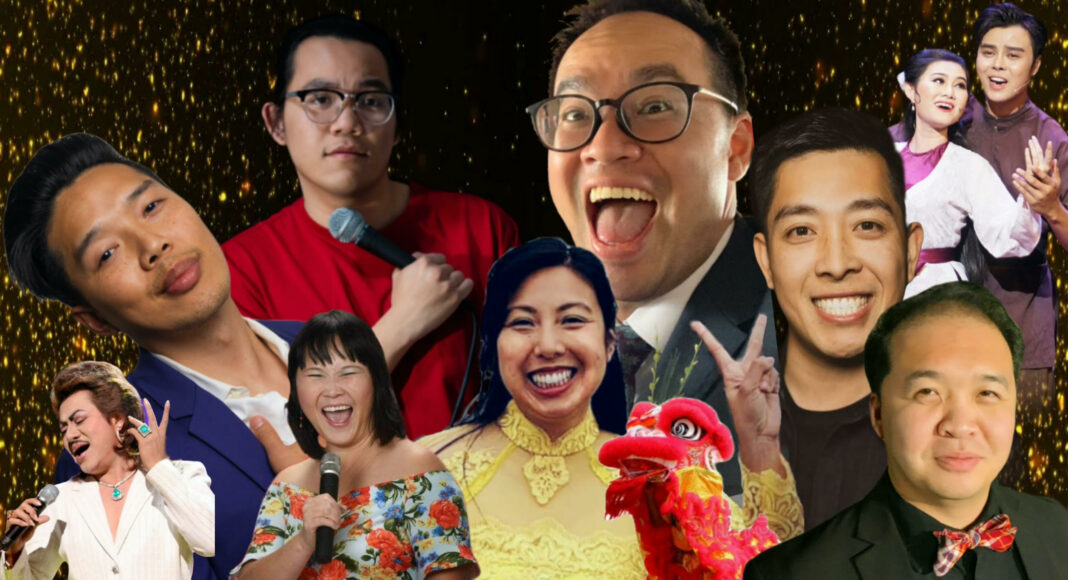When he met fellow producer Fred Le, Bay Area native Andy Van was in Los Angeles doing standup and local theater. Soon, the two banded together to showcase Vietnamese American comics in an event named after Vietnam’s most popular variety show, Paris by Night.
“The comedy is just really, really good right now. But Vietnamese comics specifically, there aren’t that many of us,” Van says.
Though the variety show has been supplanted in the American comedy scene by standup, variety shows remain popular in Vietnam and in Vietnamese American households. “Embarrassed by Night” lampoons the beloved format, combining standup with sketch elements.
Producer and performer Fred Le says that “Embarrassed by Night” is just a group of people doing what they do best: being funny. They all also happen to be Vietnamese.
“I don’t really see this show so much as a cultural expression. I just see it as a bunch of funny Vietnamese people getting together and telling jokes,” he says.
Though united by a shared culture, performer Rosie Tran says the show isn’t all wrapped up in Vietnamese American culture and identity, or the struggles of being a minority in comedy or in America.
“I certainly talk about being Vietnamese American and then I have a lot of material where I just talk about me; because being Vietnamese American, it’s a huge part of my identity, but it’s not my entire identity,” Tran says. “At the end of the day it’s fun to just be ourselves.”
For too long in American comedy, Asian Americans have been made the butt of racist jokes. As part of the comedy scene, however, Asian Americans often poke fun at their own culture and the generational divide between immigrant parents and first-generation kids. Van acknowledges the difference between making a joke as part of a marginalized or minority group and making a joke directed at a marginalized group. Still, the “line” between what is appropriate to laugh at in comedy is under constant negotiation.
Van says it’s fine to walk the line, letting loose through comedy while remaining sensitive to those who have been shafted as vulnerable minority groups.
Ultimately, Van says he “loves the line.” He sees audiences—especially white audiences—bristle when comedians make fun of a culture they are part of, or use slurs that would other times be directed at them as Asian Americans. But this is part of comedians taking the wind out of racism and laughing at the things that would normal be used against them.
“…White people will tighten up real bad. I’m like, don’t worry,” Van says. “I know I’m using this, I’m wielding this responsibly.”
Rosie Tran says she feels the “line” divides the sincere from the mean-spirited. She performs jokes about her own experiences with things like domestic violence. Though people might wince, her jokes aren’t coming from a place of punching down or making fun of domestic violence survivors.
“That’s why it’s called ‘making light’ of something,” Tran says. “You’re taking it and you’re taking the heaviness out of it, transforming it into something amazing.”
Fellow performer Nicole Tran came to the U.S. 20 years ago at the age of 20. Her bubbly personality, “squeaky clean” jokes and quick wit bring only the lightest of comedy to the showcase. She says that while Vietnamese culture connects the performers to one another, the audience needs no prior connection to Vietnam to appreciate jokes that are universally relatable and funny.
“I think if I do my act correctly, the audience will show love for me, they will go with it, they will understand, they will laugh,” Nicole Tran says. “People don’t necessarily need to be in the same boat to share the same experience.”
Rosie Tran says that comedy audiences, white or otherwise, from the Bay Area to smaller cities in the Midwest, want to see more diversity in comedy in terms of race, gender, orientation, and experiences.
“People want to hear more of these voices. That’s really my main message, is that people want to hear these voices, not just mine,” she says.
Nicole Tran agrees that comedy can connect people—any people—through laughter.
“Comedy,” she says, “is a power.”
Sat, 8pm, $25+
Tabard Theatre, San Jose



